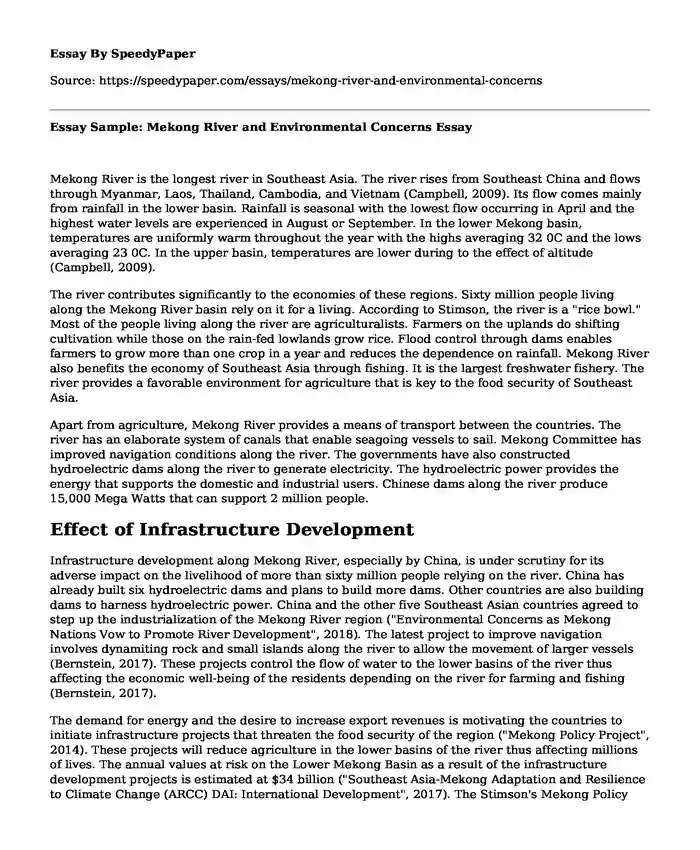
| Type of paper: | Research paper |
| Categories: | Environment Water Pollution |
| Pages: | 3 |
| Wordcount: | 753 words |
Mekong River is the longest river in Southeast Asia. The river rises from Southeast China and flows through Myanmar, Laos, Thailand, Cambodia, and Vietnam (Campbell, 2009). Its flow comes mainly from rainfall in the lower basin. Rainfall is seasonal with the lowest flow occurring in April and the highest water levels are experienced in August or September. In the lower Mekong basin, temperatures are uniformly warm throughout the year with the highs averaging 32 0C and the lows averaging 23 0C. In the upper basin, temperatures are lower during to the effect of altitude (Campbell, 2009).
The river contributes significantly to the economies of these regions. Sixty million people living along the Mekong River basin rely on it for a living. According to Stimson, the river is a "rice bowl." Most of the people living along the river are agriculturalists. Farmers on the uplands do shifting cultivation while those on the rain-fed lowlands grow rice. Flood control through dams enables farmers to grow more than one crop in a year and reduces the dependence on rainfall. Mekong River also benefits the economy of Southeast Asia through fishing. It is the largest freshwater fishery. The river provides a favorable environment for agriculture that is key to the food security of Southeast Asia.
Apart from agriculture, Mekong River provides a means of transport between the countries. The river has an elaborate system of canals that enable seagoing vessels to sail. Mekong Committee has improved navigation conditions along the river. The governments have also constructed hydroelectric dams along the river to generate electricity. The hydroelectric power provides the energy that supports the domestic and industrial users. Chinese dams along the river produce 15,000 Mega Watts that can support 2 million people.
Effect of Infrastructure Development
Infrastructure development along Mekong River, especially by China, is under scrutiny for its adverse impact on the livelihood of more than sixty million people relying on the river. China has already built six hydroelectric dams and plans to build more dams. Other countries are also building dams to harness hydroelectric power. China and the other five Southeast Asian countries agreed to step up the industrialization of the Mekong River region ("Environmental Concerns as Mekong Nations Vow to Promote River Development", 2018). The latest project to improve navigation involves dynamiting rock and small islands along the river to allow the movement of larger vessels (Bernstein, 2017). These projects control the flow of water to the lower basins of the river thus affecting the economic well-being of the residents depending on the river for farming and fishing (Bernstein, 2017).
The demand for energy and the desire to increase export revenues is motivating the countries to initiate infrastructure projects that threaten the food security of the region ("Mekong Policy Project", 2014). These projects will reduce agriculture in the lower basins of the river thus affecting millions of lives. The annual values at risk on the Lower Mekong Basin as a result of the infrastructure development projects is estimated at $34 billion ("Southeast Asia-Mekong Adaptation and Resilience to Climate Change (ARCC) DAI: International Development", 2017). The Stimson's Mekong Policy Project is focusing on creating awareness on the trans-boundary impacts of the development of hydroelectric dams and other infrastructure projects along Mekong River. Stimson and other environmental organizations are promoting the adoption of "Mekong Standards" that will specify the maximum acceptable environmental, social impact of any project ("Mekong Policy Project", 2014). It is also important for all the countries to agree on trans-boundary impacts of any project along the river (Boer, Hirsch, Johns, Saul & Scurrah, 2015). Infrastructure development should be regionally coordinated rather than nationally-led, to cater for the interests of all people (Boer, et al, 2015). For instance, China is improving navigation and constructing more dams along the river. These projects benefit China and its citizens but has adverse impacts on the lower basin of the river.
References
Bernstein, R. (2017). China's Mekong Plans Threaten Disaster for Countries Downstream. Foreign Policy. Retrieved 11 February 2018, from http://foreignpolicy.com/2017/09/27/chinas-mekong-plans-threaten-disaster-for-countries-downstream/
Boer, B., Hirsch, P., Johns, F., Saul, B., & Scurrah, N. (2015). The Mekong: A Socio-legal Approach to River Basin Development. Taylor and Francis.
Campbell, I. (2009). The Mekong: Biophysical Environment of an International River Basin. New York, NY: Academic Press.
Environmental Concerns as Mekong Nations Vow to Promote River Development. (2018). Radio Free Asia. Retrieved 11 February 2018, from https://www.rfa.org/english/news/cambodia/mekong-forum-01112018162350.html
Mekong Policy Project. (2014). Stimson Center. Retrieved 11 February 2018, from https://www.stimson.org/programs/mekong-policy-project
Southeast Asia-Mekong Adaptation and Resilience to Climate Change (ARCC) DAI: International Development. (2017). Dai.com. Retrieved 11 February 2018, from https://www.dai.com/our-work/projects/southeast-asia-mekong-adaptation-and-resilience-climate-change-arcc
Cite this page
Essay Sample: Mekong River and Environmental Concerns. (2022, Feb 28). Retrieved from https://speedypaper.com/essays/mekong-river-and-environmental-concerns
Request Removal
If you are the original author of this essay and no longer wish to have it published on the SpeedyPaper website, please click below to request its removal:
- Free Essay on the Public Education System in the United States
- Essay Example: Reflection and Opinions on World Affairs
- Diction and Imagery in Literary Texts, Free Essay for Everyone
- Human Developmental Stages, Free Essay Sample
- Essay Sample on the Expression of Pride
- Essay Sample on Supervision of Human Resource
- Essay Example - Food Insecurity Areas
Popular categories




